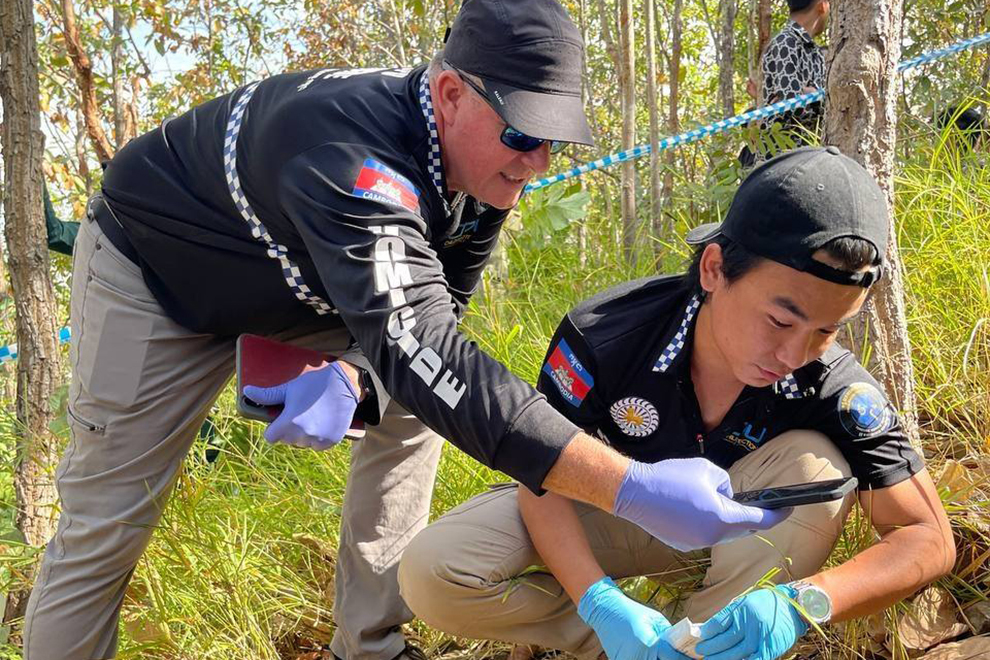September 30, 2024
PHNOM PENH – James McCabe, an Australian and former detective, has been at the forefront of Cambodia’s fight against child exploitation since 2013.
As director of operations at the Child Protection Unit (CPU), part of the Cambodian Children’s Fund (CCF), McCabe has played a key role in transforming the landscape of child protection.
Under his leadership, the CPU has become a recognised authority in investigating serious crimes against children, including homicide, sexual assault and trafficking. In recent years, the unit has also taken significant steps to address the growing threat of online crimes against children.
Recognising the need for a specialised response, McCabe spearheaded the establishment of the Internet Crimes Against Children (ICAC) unit within the CPU. This dedicated group investigates cybercrimes targeting children, such as online grooming and the distribution of explicit child abuse material.
McCabe’s relentless efforts in child protection were acknowledged in 2024 when he was awarded the prestigious Knight Grand Cross of the Royal Order of Cambodia. Additionally, five members of the CPU were honoured for their contributions, reflecting the team’s unwavering dedication to protecting vulnerable children across the country.

James McCabe investigates a woman who murdered her eight-year-old grandson in Kampong Speu province in January 2024. PHOTO: CPU/THE PHNOM PENH POST
Q&A with James McCabe
Can you provide some insights on the growing issue of online crimes against children, particularly in Cambodia, and how it compares to the global situation? Also, what steps are being taken to address this issue, especially regarding international partnerships and technological advancements?
Crimes against children on the Internet are a global issue, not specific to Cambodia. It requires a global response, and I applaud the Cambodian government’s enthusiasm and commitment to combating these crimes.
The field is challenging because it’s technology-based, and online platforms make it harder to detect and track offenders. This forum we are part of is crucial for building global partnerships with policing agencies, such as the Nordic, Dutch, European and Australian police, to share methodologies and technologies.
We have tech companies presenting ways to detect child exploitation materials on devices. This collaboration helps build the capacity of the Cambodian National Police to combat online crimes against children. Once again, I commend the government for their dedication to this cause.
With internet access spreading across Cambodia, how can the National Police ensure that efforts to combat online crimes, especially those related to child exploitation, are extended beyond just a small group of officers and cover the entire country? Also, how does Cambodia collaborate with international partners to address cross-border online crimes?

Investigators search for clues to help identify the perpetrator of the brutal murder of a young female in Tbong Khmum province in 2023. PHOTO: CPU/THE PHNOM PENH POST
That’s the reality we’re dealing with – the internet is everywhere. Online crimes, especially those targeting children, transcend borders. You can have offenders in other countries viewing or creating exploitative content that involves Cambodian children, and vice versa.
We work with the Cambodian National Police to forensically examine devices and gather digital evidence. We’re also providing software and expertise to help them detect and prevent these crimes. It’s not just about arresting offenders in Cambodia but also collaborating internationally to stop the global demand for these materials.
Do you see internet crime, particularly against children, becoming a bigger problem compared to other types of crime, like physical abuse, in Cambodia today? How has this issue evolved in recent years?
The internet is definitely a growing concern. It’s an emerging type of crime, and over the last decade, we’ve seen how it’s become a bigger issue globally. The Cambodian National Police understand this and are proactive in staying ahead of these trends.
Crime evolves – whether it’s organised crime, financial crime or online crime – and we need to stay alert to emerging patterns. Forums like this one help us discuss and plan for how to address these issues effectively.
Since internet crimes are a global issue, do you think the Cambodian National Police, particularly their cybercrime and digital forensics units, are prepared to effectively address these challenges? How close are they to fully tackling the issue?
The Cambodian National Police are well aware of the problem and have established departments like the cybercrime unit and the digital forensics unit to combat it. These are relatively new but important steps.
They are also utilising international resources, such as databases from Interpol and other global organisations. This collaboration is key to identifying and classifying online child exploitation materials. I think Cambodia is heading in the right direction, but it’s a long-term effort that requires continuous updates to technology and skills.
The CPU: A decade of impact
The CPU was established in July 2013 as part of a partnership between the CCF and the Ministry of Interior.
It is dedicated to investigating serious crimes against children throughout Cambodia, setting new standards in child protection through the integration of skilled investigators, forensic experts and aftercare professionals.
In response to the rise of cybercrimes targeting children, the CPU launched the first specialist unit in Cambodia four years ago to address internet-related child exploitation. Since then, the unit has investigated 118 cases of internet crimes against children, alongside their broader work, which includes over 2,617 major crime cases – more than 300 of them homicides.
The CPU’s continued success in fighting both offline and online crimes underscore the importance of collaboration, both domestically and internationally, in protecting the nation’s most vulnerable.

From left: James McCabe, Mike Smith and Nick Rose of the CPU. PHOTO: CPU/THE PHNOM PENH POST


